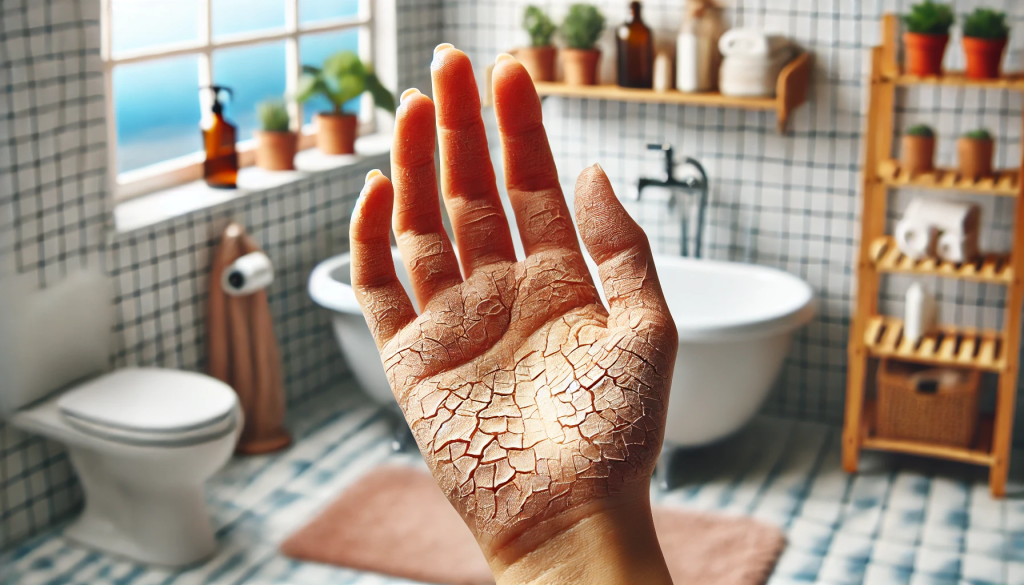Dry skin is a condition where the skin loses moisture, becoming rough, flaky, and sometimes itchy. It can occur due to numerous external and internal factors. Let’s explore the main causes of dry skin.
1. Lack of Hydration
- Inadequate water intake: Dehydration reduces moisture levels in the skin.
- Dry air: Low indoor humidity, especially during heating seasons, accelerates moisture loss from the skin’s surface.
- Frequent washing: Hot water and harsh soaps strip the skin’s natural lipid barrier.
2. Aging
- With age, the skin’s ability to retain moisture decreases due to reduced sebum production.
- Menopause: Women may experience dry skin during menopause due to hormonal changes.
3. Climatic Conditions
- Cold weather: Low temperatures and wind dry out the skin.
- Hot weather: Intense sunlight dehydrates and damages the skin’s outer layer.
4. Improper Skincare

- Using unsuitable cosmetic products: Aggressive peels or alcohol-based products worsen dry skin.
- Lack of moisturizers: Skipping moisturizing creams exacerbates dryness.
5. Medical Conditions
- Eczema and psoriasis: These conditions are marked by extreme dryness and inflammation.
- Diabetes: High blood sugar levels lead to skin dehydration.
- Hypothyroidism: Reduced thyroid function slows metabolism, causing dry skin.
6. Vitamin Deficiencies
- Deficiencies in vitamins A, E, and D: These vitamins are vital for maintaining skin health.
7. Harmful Habits
- Smoking: Reduces oxygen levels in the skin and impairs blood circulation.
- Excessive alcohol consumption: Leads to dehydration.
Conclusion

Understanding the causes of dry skin helps in selecting the right care and preventing discomfort. Regular moisturizing, balanced nutrition, and avoiding aggressive factors can keep your skin soft and healthy.
Causes of Dry Skin: Understanding the Common Triggers
Dry skin, also known as xerosis, is a common condition that can affect anyone regardless of age or skin type. It occurs when the skin lacks adequate moisture or loses its ability to retain water. Dry skin can be temporary, caused by environmental factors, or chronic, linked to underlying medical conditions. Understanding the causes of dry skin is essential for managing and preventing it effectively.
1. Environmental Factors
Environmental conditions are one of the most significant contributors to dry skin. These factors include:
- Cold Weather: During the winter months, low temperatures and humidity levels reduce the moisture in the air, leading to skin dehydration. Indoor heating further exacerbates dryness by stripping moisture from the skin.
- Hot Weather: High temperatures, especially in arid climates, can also lead to dry skin by increasing water loss through sweat evaporation.
- Wind Exposure: Wind can remove the natural oils from your skin, leaving it dry and irritated.
2. Harsh Skincare Products
Using products that are not suited for your skin type or that contain harsh chemicals can strip your skin of its natural oils. Common culprits include:
- Soaps and Cleansers: Products with strong surfactants or high alcohol content can disrupt the skin’s natural barrier.
- Excessive Exfoliation: Overuse of scrubs or exfoliants can damage the skin barrier, leading to moisture loss.
- Fragranced Products: Perfumes and artificial scents in lotions or creams can irritate sensitive skin and cause dryness.
3. Overwashing or Prolonged Water Exposure
Frequent washing or spending too much time in water, especially hot water, can strip the skin of its natural oils, leading to dryness. This is common in individuals who:
- Wash their hands frequently
- Take long, hot showers or baths
- Swim regularly in chlorinated pools
4. Aging
As we age, the skin naturally loses moisture due to a reduction in oil production and a decrease in the skin’s ability to retain water. This often results in dry, thin, and less elastic skin, particularly in older adults.
5. Dehydration
Not drinking enough water or consuming a diet low in hydrating foods can lead to skin dryness. When the body is dehydrated, it prioritizes vital organs, leaving the skin less hydrated.
6. Underlying Medical Conditions
Certain health issues can contribute to or exacerbate dry skin, including:
- Eczema (Atopic Dermatitis): A chronic condition characterized by inflamed, itchy, and dry skin.
- Psoriasis: A condition where the skin builds up too quickly, leading to scaly patches that are often dry and flaky.
- Hypothyroidism: Low thyroid hormone levels can reduce oil production in the skin, causing dryness.
- Diabetes: Poor blood circulation and high blood sugar levels can lead to dry, itchy skin in individuals with diabetes.
7. Medications
Certain medications can have side effects that include dry skin. These may include:
- Diuretics: Used to treat high blood pressure, they can dehydrate the body and skin.
- Retinoids: Commonly used for acne or anti-aging, retinoids can cause peeling and dryness as a side effect.
- Antihistamines: Used for allergies, they can reduce the skin’s natural moisture.
8. Weathering from Water Loss
When the skin barrier is compromised, moisture evaporates from the skin’s surface more quickly, leading to dryness. This can be caused by factors such as:
- Harsh environmental conditions
- Overuse of skin-stripping products
- Pre-existing skin conditions
9. Nutritional Deficiencies
Deficiencies in essential nutrients can negatively impact skin health. For instance:
- Vitamin A: Necessary for skin repair and maintenance.
- Vitamin E: An antioxidant that helps protect the skin barrier.
- Omega-3 Fatty Acids: Crucial for maintaining skin hydration and elasticity.
10. Stress
Chronic stress can disrupt the skin barrier by altering hormone levels, leading to increased water loss and reduced skin hydration.
11. Genetics
Some people are genetically predisposed to dry skin due to inherited conditions or naturally lower oil production in their skin.
Managing and Preventing Dry Skin
Understanding the causes of dry skin is the first step to effective prevention and treatment. Here are some general tips to manage dryness:
- Use a Humidifier: Especially during winter or in arid climates, a humidifier can add moisture to the air and help hydrate the skin.
- Choose Gentle Skincare Products: Look for moisturizers with ingredients like hyaluronic acid, glycerin, or ceramides, which help retain moisture.
- Limit Hot Showers: Opt for lukewarm water and limit your bath or shower time.
- Hydrate from Within: Drink plenty of water and eat foods rich in water content, such as fruits and vegetables.
- Protect Your Skin: Wear protective clothing in harsh weather conditions and apply sunscreen to prevent sun damage, which can worsen dryness.
By identifying the specific causes of your dry skin and taking proactive steps, you can achieve healthier, more hydrated skin while preventing further irritation or discomfort.

















Pingback: Hormonal Imbalances: Causes, Symptoms, and Treatment - Medhouse.info
Pingback: Unlock Your Best Skin Ever: The Complete Skincare Playbook - Medhouse.info